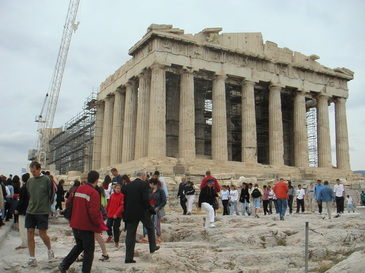
Technically, the question is still an open one, but either way the man could not have known that both would survive as long as they have. As a new temple (which was replacing one destroyed just 33 years prior by the invading Persians), the Parthenon was dedicated to the goddess Athena who, according to Greek mythology, is the goddess of wisdom, courage, inspiration, civilization, law and justice, just warfare, mathematics, strength, strategy, the arts, crafts, and skill. Heady stuff, well worth remembering, but many monuments similarly dedicated have eroded around the world into windblown dust. The words of Socrates, much like the previous acropoleis on the hill, were also silenced by attacks from ignorant foes, only to be raised again by succeeding and remembering generations. We know about his drinking of hemlock, punished for being the gadfly of Athens that stung the state into action, but like Athena, a goddess of war strategy who disliked fighting without purpose and preferred to use wisdom to settle predicaments, Socrates stood by his principles, dying stoically for his beliefs, trusting his wisdom to withstand the painful attacks of the moment as well as the slow erosion of the future. He was rightly confident with wisdom expressed in words such as these:
The unexamined life is not worth living.
Let him who would move the world, first move himself.
Wonder is the feeling of a philosopher, and philosophy begins in wonder.
Beware the barrenness of a busy life.
I am not an Athenian or a Greek, but a citizen of the world.
The difficulty is not in avoiding death, but in avoiding unrighteousness; for that runs deeper than death.
Is there not one true coin, for which all things ought to exchange?--and that is wisdom.
All I know is that I know nothing.
Still relevant today. But let's take a look at more than just these aphorisms and see how the general ideas of Socrates fare in my evaluation of the Survival of the Fittest Philosophers.
----------------------------------------------------------------
Socrates (469-400 BCE) Credited as one of the founders of Western philosophy, he is an enigmatic figure known chiefly through the writings of his student Plato.
Survives
His most important contribution to Western thought is his dialectic method of inquiry, known as the Socratic method. To solve a problem, it would be broken down into a series of questions, the answers to which gradually distill the answer a person would seek. The influence of this approach is most strongly felt today in the use of the scientific method, in which hypothesis is the first stage. He cross-examined people to try and discover the meaning of virtues, but mostly exposed ignorance of others. A very useful way to start any task.
Socrates believed the best way for people to live was to focus on self-development rather than the pursuit of material wealth. He invited others to try to concentrate more on friendships and a sense of true community, for Socrates felt this was the best way for people to grow together as a populace. These are the correct focus points for a cooperative species that requires knowledge to maintain its existence.
Socrates opposed the moral relativism of Sophists. He believed there were objective moral standards that could be discovered, that there were right and wrong answers to moral questions that went beyond mere opinion and popular sentiment. We are now discovering these rules through the understanding of the principles of evolution and how species survive.
Needs to Adapt
Socrates objected to any form of government that did not conform to his ideal of a perfect republic led by philosophers. Once the true purpose of government is understood, we see that there are places for many different kinds of people in this sphere - economists, managers, criminologists, educators, scientists. They should not be philosophers in the strict definition of today, but they should all be aware of the philosophy that governs government.
One of the best-known sayings of Socrates is, "I only know that I know nothing." The conventional interpretation of this remark is that Socrates' wisdom was limited to an awareness of his own ignorance. Pithy, but diminishes the enormous wealth of knowledge that humans actually have now. It is worth keeping in mind however that there is still much to learn.
Gone Extinct
In the Dialogues of Plato, Socrates often seems to support a mystical side, discussing reincarnation and the mystery religions. This is an unfortunate side effect of the ignorance of the times.
----------------------------------------------------------------
He wasn't always right, but if I had to guess, I would say that as long as Greece is peaceably populated by Greeks, the Parthenon will remain supported and standing, but as long as there are humans anywhere who note the birth of critical thinking, then Socrates will be remembered. Stronger than stone? Sometimes philosophy can be.

